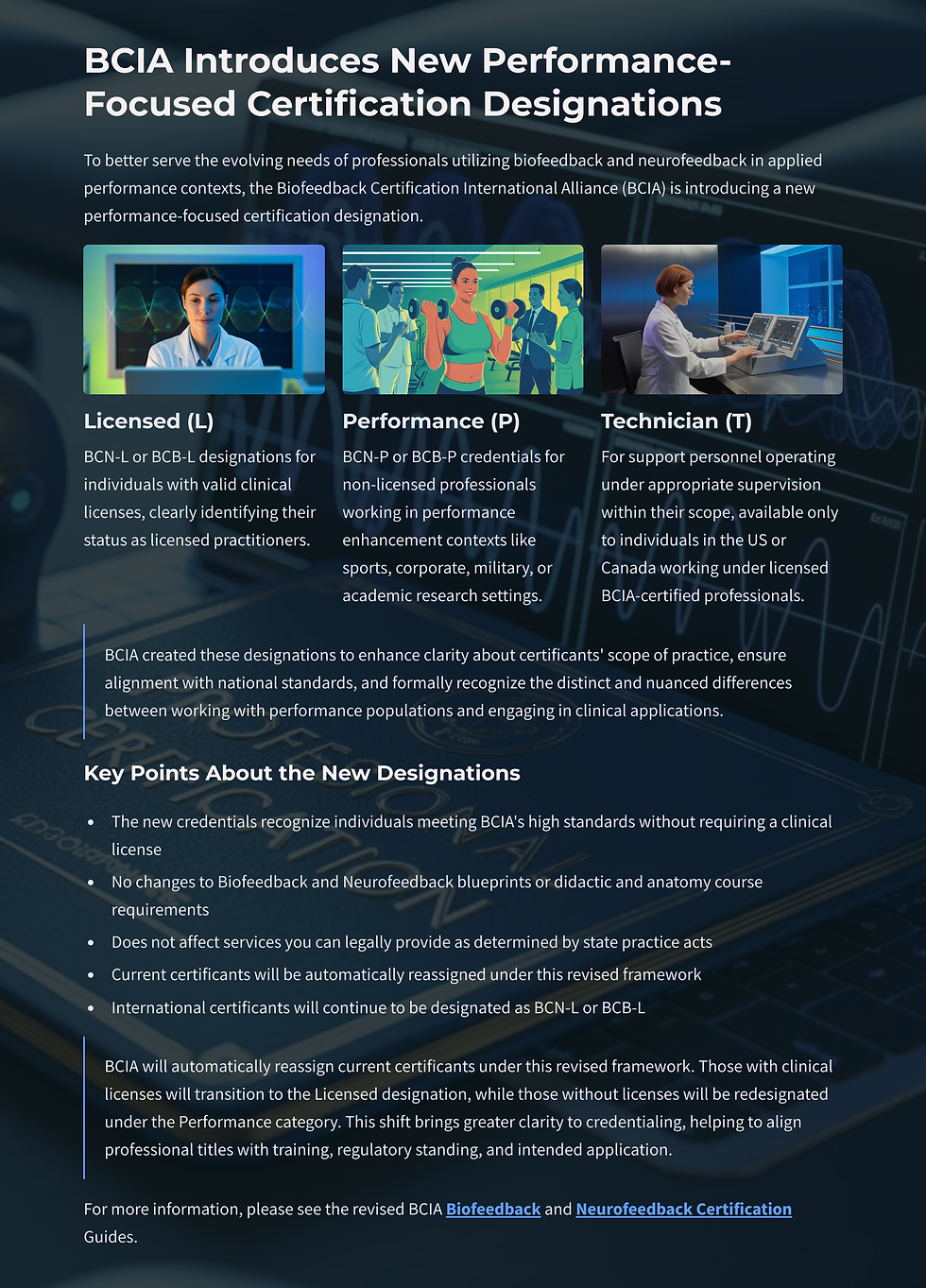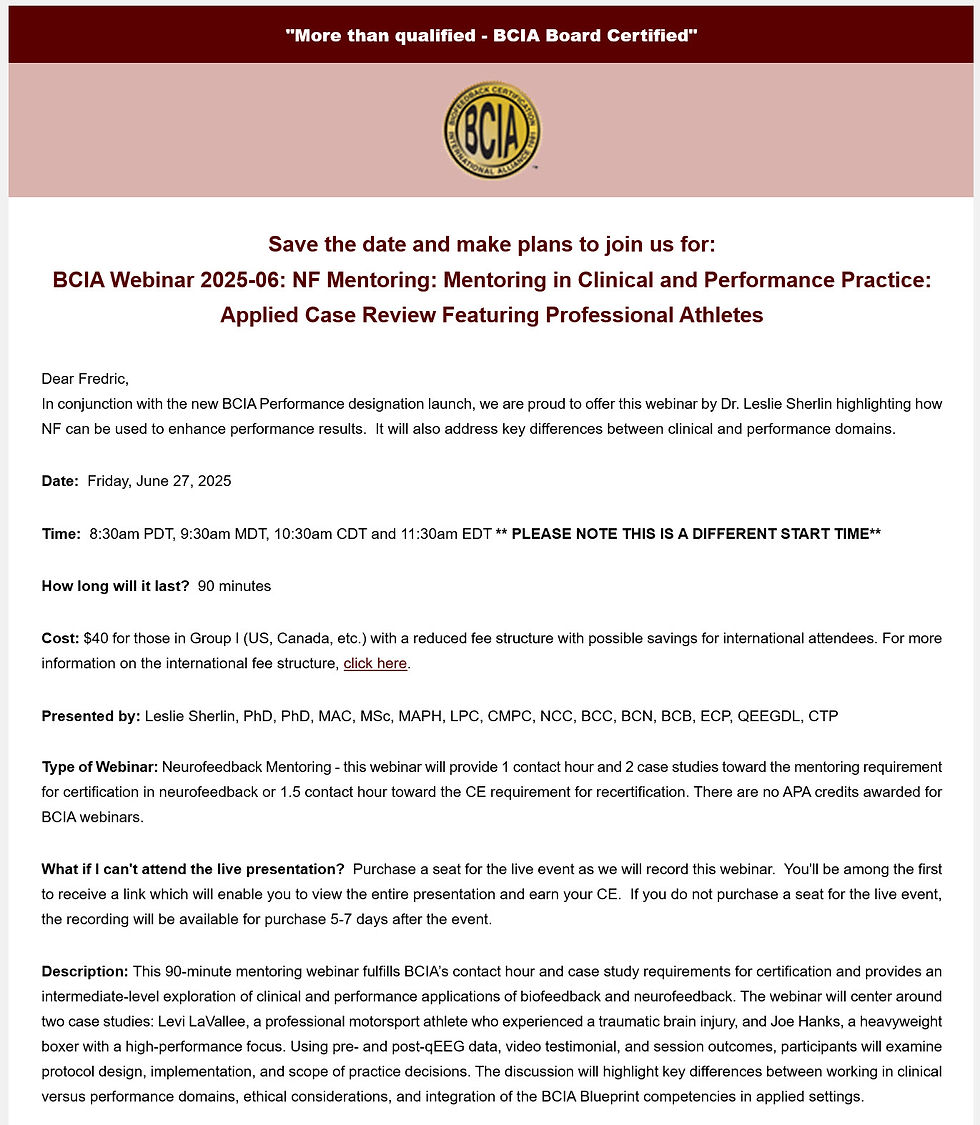BCIA's New Performance Certification Designation
- Fred Shaffer
- Jun 11, 2025
- 3 min read
Updated: Jun 25, 2025

To better serve the evolving needs of professionals utilizing biofeedback and neurofeedback in applied performance contexts, the Biofeedback Certification International Alliance (BCIA) is introducing a new performance-focused certification designation.
New Designations for Performance Professionals
The new credentials—BCN-P (Board Certified in Neurofeedback – Performance) and BCB-P (Board Certified in Biofeedback – Performance)—recognize individuals who meet BCIA’s high standards of education, training, and demonstrated competence in performance enhancement, without requiring a clinical license.
This certification track was created to clarify the scope of practice, align with national standards, and formally acknowledge the distinct demands of working with performance populations, such as athletes, executives, and performers, as opposed to clinical clients.
Please see our revised BCIA Biofeedback and Neurofeedback Certification Guides.
Impact on Required Courses and Your Practice
BCIA's new designations do not change the Biofeedback and Neurofeedback blueprints or didactic and anatomy course requirements. Likewise, they do not affect the services you can legally provide since your state's practice act determines this.
BCIA created these designations to enhance clarity about certificants' scope of practice, ensure alignment with national standards, and formally recognize the distinct and nuanced differences between working with performance populations and engaging in clinical applications.
Three Distinct Certification Categories
With this update, the Biofeedback Certification International Alliance (BCIA) now formally distinguishes among three categories of certificants, reflecting differences in professional roles, qualifications, and intended scope of practice.
Licensed (L)
Individuals who hold a valid clinical license will be designated as BCN-L (Board Certified in Neurofeedback – Licensed) or BCB-L (Board Certified in Biofeedback – Licensed), clearly identifying their status as licensed practitioners.
Performance (P)
Those who are not clinically licensed but work in performance enhancement contexts, such as sports, corporate, military, or academic research settings, will receive the new performance-oriented credentials of BCN-P or BCB-P.
Technician (T)
In addition, a third category, Technician, will apply to support personnel who operate under appropriate supervision within their scope.
Technician certification is available only to individuals residing and working in the United States or Canada who are under the legal supervision of a licensed professional holding a BCIA certification in biofeedback or neurofeedback. This certification pathway does not require a specific educational background, making it accessible to a broad range of applicants.
Technicians must work under the direct oversight of a BCIA-certified and licensed supervisor who is legally authorized to oversee non-licensed personnel. Technicians must operate strictly within the scope of their supervisor’s practice and are not permitted to supervise or mentor other certification candidates.
If a technician's employment status changes, their certification becomes inactive. It remains invalid until the individual can again demonstrate active employment under appropriate supervision, in full compliance with the certification standards.
Takeaways
BCIA's new performance designation will not affect didactic and anatomy course requirements or the services you can legally provide. Full stop.
All future applicants will follow one of these three pathways, determined by their academic qualifications, credentials, and licensure.
BCIA will automatically reassign current certificants under this revised framework. Those with clinical licenses will transition to the Licensed designation, while those without licenses will be redesignated under the Performance category. This shift brings greater clarity to credentialing, helping to align professional titles with training, regulatory standing, and intended application.
International certificants will continue to be designated as BCN-L or BCB-L, as licensure remains a requirement for international certifications.

About the Author
Fred Shaffer earned his PhD in Psychology from Oklahoma State University. He is a biological psychologist and professor of Psychology, as well as a former Department Chair at Truman State University, where he has taught since 1975 and has served as Director of Truman’s Center for Applied Psychophysiology since 1977. He served as BCIA Chair from 2010 to 2017 and as its Treasurer from 2017 to present. Since he is an unlicensed educator, BCIA will transition his credential to BCB-P.

Learn About Clinical and Performance Mentoring from Leslie Sherlin





Comments